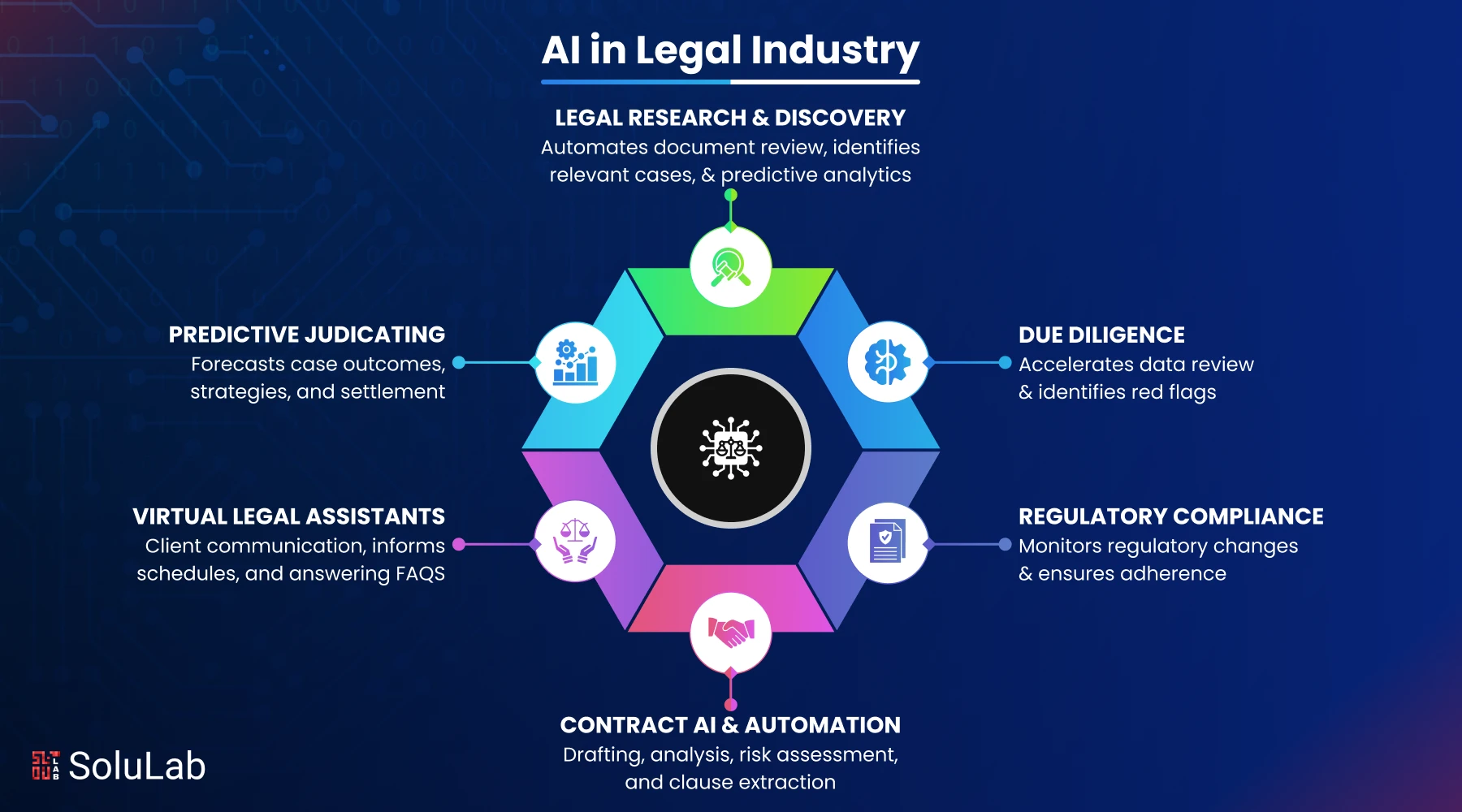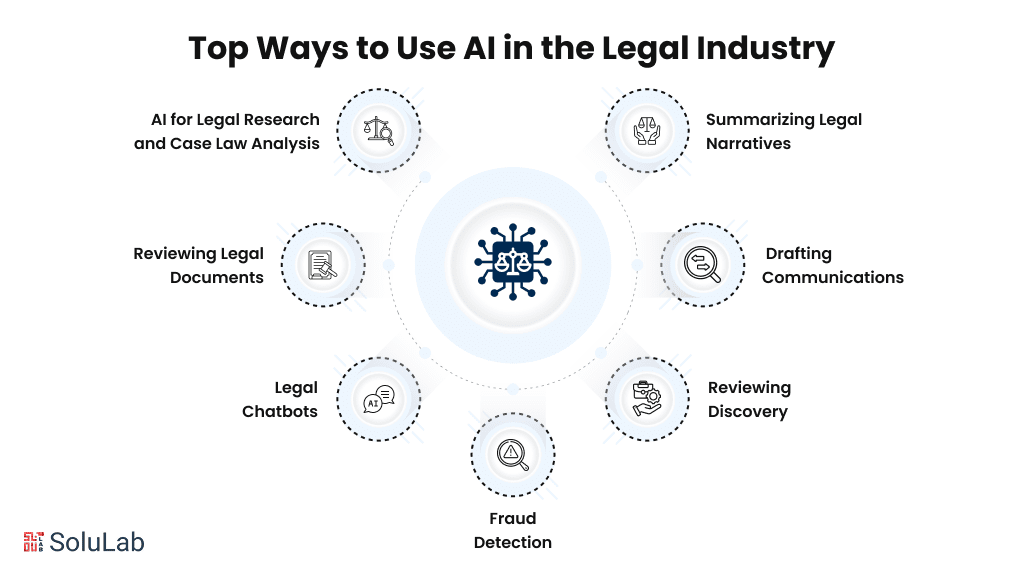
Lawyers and legal teams often spend countless hours going through case files, contracts, and endless paperwork.
However, Legal work isn’t getting easier. Case files are growing. Clients want results faster. And your time? It’s too valuable to waste on outdated methods.
AI in law is no longer optional. Using AI tools is a must to save hours on research, routine tasks, improving accuracy, and even predicting legal outcomes. The global legal AI market is projected to reach $2.5 billion by 2028, growing at a CAGR of 35%.
From contract analysis to legal analytics, AI tools are improving how law firms operate, reducing costs, and enhancing client service. In this blog, we’ll walk you through AI’s benefits, ways to use it, and 5 AI tools for legal practice.
What is AI in law?
The usage of artificial intelligence technologies (such as machine learning, natural language processing, and automation) to carry out legal activities that are done by humans can be called AI in law.
AI does not replace lawyers but enables them to do legal research, analyze contracts, review documents, and even forecast the result of cases. It is eliminating routine tasks, increasing accuracy, and saving money, and thus, making law firms and legal departments more efficient.
Benefits of Using AI in the Legal Industry
In the legal industry, AI is improving efficiency, efficiency, and process automation, lowering time and price. Plus, used to make better decisions more quickly, thus allowing firms to provide faster, smarter, more customer-centric legal services.
- Increased Efficiency: AI applications can automate simple, legal activities such as contract reviews and the fight of legal data, reducing time and person-hours of work. This enables the lawyers to practice more in terms of strategy and issues related to a specific client.
- Cost Reduction: Law firms do not have to be so dependent on billable hours, as AI tools allow them to do repetitive work. This reduces the cost of operations and enables the clients to gain access to cheap legal solutions.
- Improved Client Service: AI allows law firms to be more reactive and responsive to clients through faster turnaround times and data-driven insight, increasing satisfaction and sustaining relationships over time.
- Improved Decision-Making: Smart legal decisions may be made with the analysis of huge legal databases, precedents, and up-to-date case data using AI tools. This will enable deployment of legal teams to evaluate risks and develop better arguments.
Top 7 Ways to Use AI in the Legal Industry
Generative AI in the legal industry is changing how legal professionals work. From research to fraud detection, here are seven practical AI use cases in legal businesses that drive efficiency and accuracy.

1. AI for Legal Research and Case Law Analysis
AI in legal businesses helps analyze case law, past judgments, and legal precedents within seconds. It reduces manual research hours and uncovers relevant case references, and improves how AI and law now work together.
2. Summarizing Legal Narratives
Generative AI in the legal industry can convert lengthy legal documents or transcripts into concise summaries. This is especially useful for lawyers who need to digest complex information quickly without missing important points.
3. Reviewing Legal Documents
AI tools scan contracts and agreements to spot errors, inconsistencies, or missing clauses. These tools improve compliance and reduce human oversight in document review, a common use case in legal businesses.
4. Drafting Communications
AI tools can draft routine legal communications, memos, and client emails. This speeds up internal operations and frees up time for more strategic work by demonstrating smart AI use cases in legal businesses.
5. Legal Chatbots
AI-powered legal chatbots can answer FAQs, guide clients, or assist in form filling. They enhance customer support, offer 24/7 availability, and are now a staple AI use case in legal businesses.
6. Reviewing Discovery
During litigation, AI can filter through massive volumes of documents in the discovery phase to identify relevant evidence. This accelerates case preparation and reduces costs, another key example of AI and law working in sync.
7. Fraud Detection
AI algorithms detect patterns and anomalies in financial transactions and legal documents. This helps law firms and legal departments prevent fraud and ensure regulatory compliance, proving how vital AI in legal businesses has become.
Top 5 AI Tools for the Legal Industry
Artificial Intelligence in Legal Practice is being quickly adopted by the legal sector. These are the top 5 artificial intelligence (AI) tools for legal practice that are improving the effective and intelligent operation of law firms.

1. Spellbook, the Best AI Tool for Law Firms Overall
Spellbook’s direct integration with Microsoft Word enables lawyers to use GPT-4 to prepare contracts. It is the greatest AI tool for legal practice overall because it can comprehend legal language, provide real-time recommendations, and minimize manual labor.
2. ChatGPT
ChatGPT is a flexible tool for writing memoranda, conducting legal research, and summarizing case law. Despite not being designed with legal work in mind, its conversational style and flexibility make it an effective element of AI in the legal field.
3. The Lex Machina
Lex Machina offers insights into lawyers, courts, and case outcomes using data analytics. With its strong, predictive analytics, it boosts fighting tactics and shows the developing importance of AI in the legal sector.
4. Reuters Thomson
AI-enhanced solutions from Thomson Reuters include Quick Check for quick analysis and Westlaw Edge for legal research. Its advanced technologies make difficult research easier, revealing the true potential of AI in legal practice.
5. LawGeex
Contract reviews are automated by LawGeex, which compares papers to pre-established policies. One of the most useful AI technologies for legal practice in today’s digital law firms, it increases speed, accuracy, and compliance.
What is the Future of AI in Law?
With the development of technology, AI will not only simplify repetitive tasks but will also help in legal strategy, risk assessment, as well as predict the result of cases. Machine learning and natural language processing tools will process huge amounts of data in less time than humans.
Enabling lawyers to make better decisions. There will be virtual legal assistants who will receive the client inquiries, and they will attend to and assist in case preparation. AI can also improve access to justice in spaces where legal advice is out of reach in developed nations by providing low-cost access to justice services.
Yet, questions concerning the privacy of data, algorithmic discrimination, and ethical applications of AI are also brought up in the future. Law firms will balance the use of technology and human decision-making.
Possible changes in regulatory frameworks might also become the means of regulating the use of AI in legal contexts.
Conclusion
Law firms adopting AI-driven solutions are gaining a competitive edge by saving time, reducing costs, and delivering better client service. While AI won’t replace lawyers, it empowers them to focus on high-value strategic work.
As AI in legal practice continues to evolve, firms that use it early will lead the way in efficiency, innovation, and shaping the future of legal services. Digital Quest, a travel business, partnered with SoluLab to develop an AI-powered chatbot using Generative AI. The chatbot enhanced customer engagement by offering real-time, personalized travel recommendations and hassle-free reservations.
SoluLab, an AI development company, can help you automate your legal firm to reduce costs and manual work. Get in touch with us today!
FAQs
1. Can AI replace lawyers in the future?
No, AI will assist lawyers rather than replace them. While AI can undertake repetitive jobs in the legal field, human judgment and legal knowledge are still crucial.
2. Is AI in legal services legal and ethical?
When applied properly, AI in legal practice is both morally and legally acceptable. It improves compliance while ensuring fairness through human oversight, striking a balance between ethics and AI-driven legal sector solutions.
3. What is the best legal AI tool?
Spellbook’s smooth contract drafting makes it one of the greatest AI tools for legal practice. For particular AI use cases, there are also Lex Machina and LawGeex. Still in doubt, then connect with our experts
4. The Impact of Artificial Intelligence on Law Firms’ Business?
In the legal sector, artificial intelligence improves client service, reduces expenses, and increases efficiency. It is changing how law firms operate and demonstrating the practical advantages of artificial intelligence in the legal sector.
5. How to implement AI in the law business?
Start by determining which duties, such as contract review or research, AI can automate. To optimize AI’s contribution to the legal sector and enhance operations, select tools that are in line with clear objectives.





